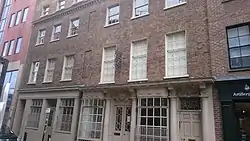56 Artillery Lane
56 Artillery Lane is an 18th-century Grade I listed building in Spitalfields, London.[lower-alpha 1] The building is situated in the Artillery Passage, and was merged with the now Grade II listed building 58 Artillery Lane after the Second World War; their combined shop front is one of the oldest in London, and the combined building is used by Raven Row as a free art exhibition centre.[1]
| 56 Artillery Lane | |
|---|---|
 56 and 58 Artillery Lane, including the Georgian shopfront | |
| General information | |
| Location | Spitalfields |
| Town or city | London, E1 |
| Country | United Kingdom |
| Coordinates | 51.518149°N 0.076879°W |
| Current tenants | Raven Row |
| Renovated | 1756 |
| Design and construction | |
| Architect(s) | Sir Robert Taylor |
History
It is not known exactly when the first house at 56 Artillery Lane was built, although a house appears at the location on a map of 1677. The original name of the building was 3 Raven Row. During the early 18th century, deed documents show that the building was owned by a mercer named Mathew Hebart and later a weaver named Thomas Wilkes.[2] The building was rebuilt between 1750 and 1756, in order to accommodate Huguenot silk merchants Nicholas Jourdain and Francis Rybot who wanted to use the building as a silk shop; it is believed that Sir Robert Taylor was the architect. The 1756 building, including its shop front, still exists today, making it one of the oldest shop fronts in London.[2][3][4][5] In the 19th and early 20th centuries, the building was used as a grocery shop.[6]: 6
After the Second World War, 56 and 58 Artillery Lane were merged into a single office building, and 56 Artillery Lane became a Grade I listed building in 1950.[7][8] In 1972, the building was refurbished after a major fire.[7] In 2006, an excavation of 56 and 58 Artillery Lane took place,[6]: 13 and the buildings were later sold to Alex Sainsbury, heir to the Sainsbury's food chain, who converted them into the Raven Row free art exhibition space.[7][3]
Notes
- Some sources say the building is in Bethnal Green.
References
- Siobhan Wall (2011), "Raven Row", Quiet London, p. 121, ISBN 978-0-7112-3190-0
- "Artillery Passage and south side of Artillery Lane". British History Online. Retrieved 8 May 2016.
- Glancey, Jonathan (27 March 2009). "Raven Row art gallery: east London architecture at its finest". The Guardian. Retrieved 8 May 2016.
- "Free Walking Tour Of The East End Of London". Inspiring City. 1 November 2013. Retrieved 8 May 2016.
- "6a Architects: Raven Row gallery, Spitalfields, east London". Architecture Today. 2 March 2009. Archived from the original on 3 June 2016. Retrieved 8 May 2016.
- "56–58 Artillery Lane, London E1, London Borough of Tower Hamlets: An archaeological evaluation report" (PDF) (pdf). Museum of London Archaeology Service. August 2006. Retrieved 8 May 2016.
- Hensel, Michael; Hensel, Defne Sungurogl; Ertas, Hulya (January 2011). Turkey: At the Threshold. John Wiley & Sons. p. 121. ISBN 9780470743195. Retrieved 8 May 2016.
- "56 Artillery Lane". Historic England. Retrieved 8 May 2016.